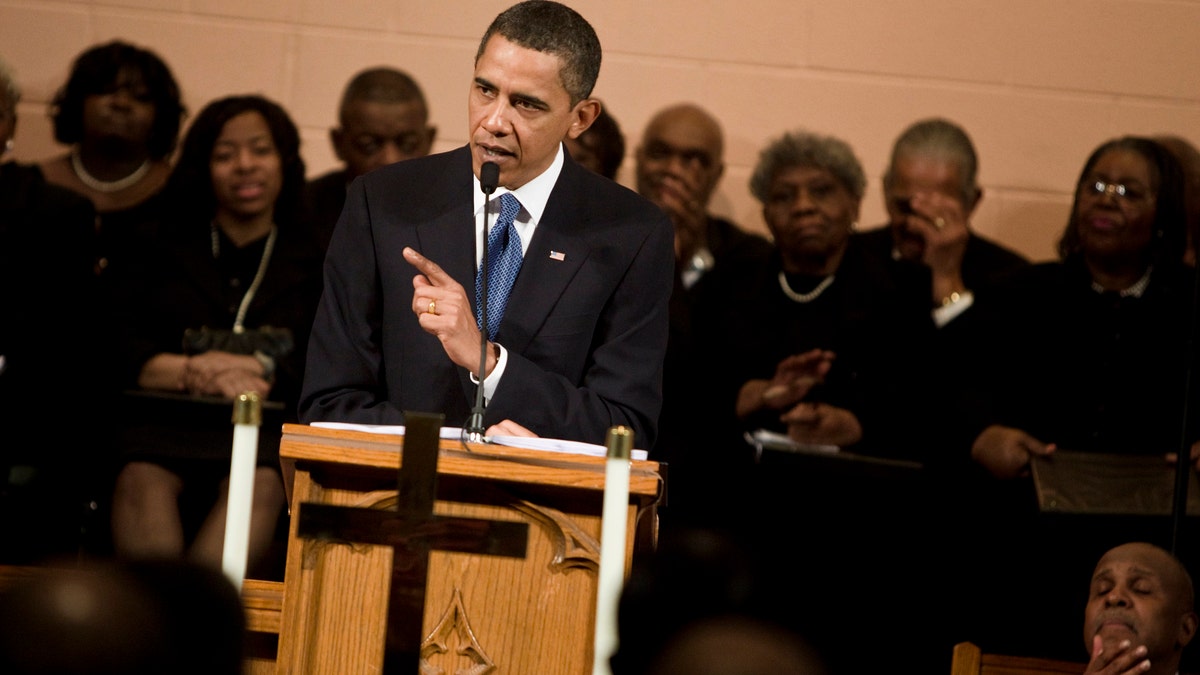
President Barack Obama speaks at Vermont Avenue Baptist Church January 17, 2010 in Washington, DC. (Photo by Brendan Smialowski/Getty Images) (2010 Getty Images)
In a neck-and-neck race for the presidency, unique and unpredictable religious issues may produce subtle but significant shifts that could play a role in deciding the election between President Obama and former Massachusetts Gov. Mitt Romney.
Most important are evangelical Christians, one of the most powerful and reliable voting blocs in the Republican party. Many of them are unsettled by Romney's Mormon faith.
Obama has turned many evangelicals off with his support for abortion rights and his new backing of same-sex marriage, which are anathema to Christian conservatives. Many fundamentalist Christians consider Romney's religion a sect and not Christian.
Furthermore, Romney's positions on certain social issues like abortion have shifted over the years, fueling doubts among some Republicans about his conservative convictions. He now says he opposes abortion.
The question, then, becomes will Christian conservatives go to the polls?
During the Republican primary race, many evangelicals voted for Romney's more conservative rivals, including Rick Santorum and Michelle Bachman.
"What happens to the conservative evangelical force that supported Santorum and Bachmann? My sense is that a lot of them will stay home," said Katherine Knutson, a political scientist who studies religion and politics at Gustavus Adolphus College.
"This is such a strange election when it comes to religion," Knutson said. "Tensions among various sectors of the religious factions make this a really unusual period."
Latinos, predominantly Obama supporters, may be distracted by religious issues. Some 62 percent of Latinos identify as Catholics, according to the Pew Hispanic Center, and they will be watching as the church hierarchy sues the Obama administration over health insurance coverage for birth control, citing its belief the government is impinging on religious freedom.
Some Latinos will be torn between loyalty to their bishops, who are at odds with Obama on contraception, and the president, who is much preferred over Romney on issues surrounding immigration. That's hugely important for Latino voters – some 90 percent of Latino voters support the DREAM Act and 85 percent support a path to citizenship for the undocumented, according to a Fox News Latino poll of likely Latino voters conducted in March.
Latinos evangelicals, who tend to view Obama differently than their non-Latino counterparts, will face a similar dilemma.
The president's change of position on gay marriage, though offensive to their religious views, did not entirely alienate Latino evangelicals.
“Hispanic evangelicals are the quintessential swing voters,” Rev. Gabriel Salguero of the National Latino Evangelical Coalition told told Fox News Latino. “We’re conservative on social issues and progressive on immigration, poverty and housing. So the question is, which will be the issue of the day?”
The already close race could well tip for one candidate or the other over religious issues if uncertainty among mainstream Catholics is mixed with conservative evangelicals.
For the large majority of evangelicals who do vote, they are expected to fall in line behind Romney, largely because of his positions on social issues.
Tony Perkins, president of the deeply conservative and influential Family Research Council, reflected the evangelical position in a statement after Romney gave the commencement address at Liberty University. The school was founded by a now-deceased television evangelist who had a huge following.
Perkins had been slow to accept Romney as the Republican nominee and has been ambiguous in answering whether Mormonism was a Christian denomination or a sect. Assessing the former Massachusetts governor's appearance at Liberty, Perkins said: "Mr. Romney seized it by emphasizing the shared values he holds with evangelicals even while acknowledging theological differences."
Beyond that, Perkins said: "Mitt Romney's address gives me a sense of hope that he will build on this message at a time when millions of voters are reeling from President Obama's endorsement for redefining marriage."
While hardly a full-throated endorsement, it was a signal that a vote for Romney was the only choice for evangelicals.
Religion also stands to play a role with black voters, Obama's strongest backers. Many African-Americans have seen some of their church leaders loudly oppose Obama's recent declaration in favor of gay marriage.
Obama himself has attended church sporadically in Washington since becoming president.
His religious past became a problem for him during the last presidential race when controversial sermons by his former pastor, the Rev. Jeremiah Wright, surfaced on television and online. Obama eventually severed his ties to Wright, whom the president had credited with leading him to Christianity.
Eligible voters among the nation's few million Muslims, not historically tied to either party but who overwhelmingly backed Obama in 2008, are disappointed with the president's inability to budge Israel on ending Jewish settlements in land Palestinians claim as their own.
Jews, a small but powerful group of voters, historically back a Democrat but have seen Obama get uncharacteristically tough with Israel over the settlement issue. That's had a lingering effect even though Obama has since dropped the issue in the face of a stern and public rebuke from Israeli leader Benjamin Netanyahu.
Based on reporting by the Associated Press.
Follow us on twitter.com/foxnewslatino
Like us at facebook.com/foxnewslatino




